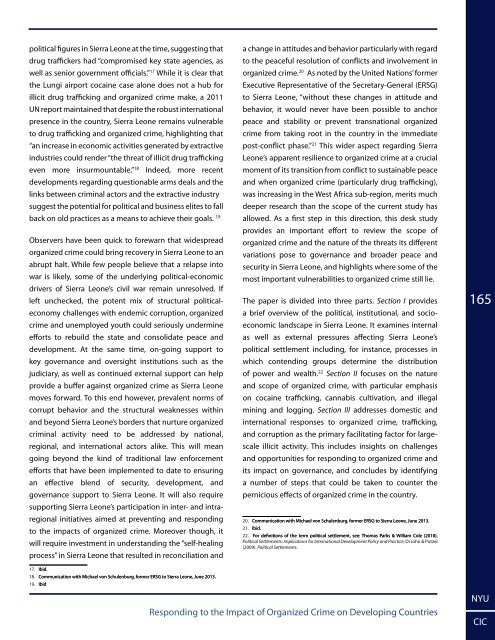here - Center on International Cooperation - New York University
here - Center on International Cooperation - New York University
here - Center on International Cooperation - New York University
You also want an ePaper? Increase the reach of your titles
YUMPU automatically turns print PDFs into web optimized ePapers that Google loves.
political figures in Sierra Le<strong>on</strong>e at the time, suggesting that<br />
drug traffickers had “compromised key state agencies, as<br />
well as senior government officials.” 17 While it is clear that<br />
the Lungi airport cocaine case al<strong>on</strong>e does not a hub for<br />
illicit drug trafficking and organized crime make, a 2011<br />
UN report maintained that despite the robust internati<strong>on</strong>al<br />
presence in the country, Sierra Le<strong>on</strong>e remains vulnerable<br />
to drug trafficking and organized crime, highlighting that<br />
“an increase in ec<strong>on</strong>omic activities generated by extractive<br />
industries could render “the threat of illicit drug trafficking<br />
even more insurmountable.” 18 Indeed, more recent<br />
developments regarding questi<strong>on</strong>able arms deals and the<br />
links between criminal actors and the extractive industry<br />
suggest the potential for political and business elites to fall<br />
back <strong>on</strong> old practices as a means to achieve their goals. 19<br />
Observers have been quick to forewarn that widespread<br />
organized crime could bring recovery in Sierra Le<strong>on</strong>e to an<br />
abrupt halt. While few people believe that a relapse into<br />
war is likely, some of the underlying political-ec<strong>on</strong>omic<br />
drivers of Sierra Le<strong>on</strong>e’s civil war remain unresolved. If<br />
left unchecked, the potent mix of structural politicalec<strong>on</strong>omy<br />
challenges with endemic corrupti<strong>on</strong>, organized<br />
crime and unemployed youth could seriously undermine<br />
efforts to rebuild the state and c<strong>on</strong>solidate peace and<br />
development. At the same time, <strong>on</strong>-going support to<br />
key governance and oversight instituti<strong>on</strong>s such as the<br />
judiciary, as well as c<strong>on</strong>tinued external support can help<br />
provide a buffer against organized crime as Sierra Le<strong>on</strong>e<br />
moves forward. To this end however, prevalent norms of<br />
corrupt behavior and the structural weaknesses within<br />
and bey<strong>on</strong>d Sierra Le<strong>on</strong>e’s borders that nurture organized<br />
criminal activity need to be addressed by nati<strong>on</strong>al,<br />
regi<strong>on</strong>al, and internati<strong>on</strong>al actors alike. This will mean<br />
going bey<strong>on</strong>d the kind of traditi<strong>on</strong>al law enforcement<br />
efforts that have been implemented to date to ensuring<br />
an effective blend of security, development, and<br />
governance support to Sierra Le<strong>on</strong>e. It will also require<br />
supporting Sierra Le<strong>on</strong>e’s participati<strong>on</strong> in inter- and intraregi<strong>on</strong>al<br />
initiatives aimed at preventing and resp<strong>on</strong>ding<br />
to the impacts of organized crime. Moreover though, it<br />
will require investment in understanding the “self-healing<br />
process” in Sierra Le<strong>on</strong>e that resulted in rec<strong>on</strong>ciliati<strong>on</strong> and<br />
17. Ibid.<br />
18. Communicati<strong>on</strong> with Michael v<strong>on</strong> Schulenburg, former ERSG to Sierra Le<strong>on</strong>e, June 2013.<br />
19. Ibid<br />
a change in attitudes and behavior particularly with regard<br />
to the peaceful resoluti<strong>on</strong> of c<strong>on</strong>flicts and involvement in<br />
organized crime. 20 As noted by the United Nati<strong>on</strong>s’ former<br />
Executive Representative of the Secretary-General (ERSG)<br />
to Sierra Le<strong>on</strong>e, “without these changes in attitude and<br />
behavior, it would never have been possible to anchor<br />
peace and stability or prevent transnati<strong>on</strong>al organized<br />
crime from taking root in the country in the immediate<br />
post-c<strong>on</strong>flict phase.” 21 This wider aspect regarding Sierra<br />
Le<strong>on</strong>e’s apparent resilience to organized crime at a crucial<br />
moment of its transiti<strong>on</strong> from c<strong>on</strong>flict to sustainable peace<br />
and when organized crime (particularly drug trafficking),<br />
was increasing in the West Africa sub-regi<strong>on</strong>, merits much<br />
deeper research than the scope of the current study has<br />
allowed. As a first step in this directi<strong>on</strong>, this desk study<br />
provides an important effort to review the scope of<br />
organized crime and the nature of the threats its different<br />
variati<strong>on</strong>s pose to governance and broader peace and<br />
security in Sierra Le<strong>on</strong>e, and highlights w<str<strong>on</strong>g>here</str<strong>on</strong>g> some of the<br />
most important vulnerabilities to organized crime still lie.<br />
The paper is divided into three parts. Secti<strong>on</strong> I provides<br />
a brief overview of the political, instituti<strong>on</strong>al, and socioec<strong>on</strong>omic<br />
landscape in Sierra Le<strong>on</strong>e. It examines internal<br />
as well as external pressures affecting Sierra Le<strong>on</strong>e’s<br />
political settlement including, for instance, processes in<br />
which c<strong>on</strong>tending groups determine the distributi<strong>on</strong><br />
of power and wealth. 22 Secti<strong>on</strong> II focuses <strong>on</strong> the nature<br />
and scope of organized crime, with particular emphasis<br />
<strong>on</strong> cocaine trafficking, cannabis cultivati<strong>on</strong>, and illegal<br />
mining and logging. Secti<strong>on</strong> III addresses domestic and<br />
internati<strong>on</strong>al resp<strong>on</strong>ses to organized crime, trafficking,<br />
and corrupti<strong>on</strong> as the primary facilitating factor for largescale<br />
illicit activity. This includes insights <strong>on</strong> challenges<br />
and opportunities for resp<strong>on</strong>ding to organized crime and<br />
its impact <strong>on</strong> governance, and c<strong>on</strong>cludes by identifying<br />
a number of steps that could be taken to counter the<br />
pernicious effects of organized crime in the country.<br />
20. Communicati<strong>on</strong> with Michael v<strong>on</strong> Schulenburg, former ERSG to Sierra Le<strong>on</strong>e, June 2013.<br />
21. Ibid.<br />
22. For definiti<strong>on</strong>s of the term political settlement, see: Thomas Parks & William Cole (2010).<br />
For definiti<strong>on</strong>s of the term political settlement, see: Thomas Parks & William Cole (2010).<br />
Political Settlements: Implicati<strong>on</strong>s for Internati<strong>on</strong>al Development Policy and Practice; Di John & Putzel<br />
(2009). Political Settlements.<br />
165<br />
Resp<strong>on</strong>ding to the Impact of Organized Crime <strong>on</strong> Developing Countries<br />
NYU<br />
CIC
















